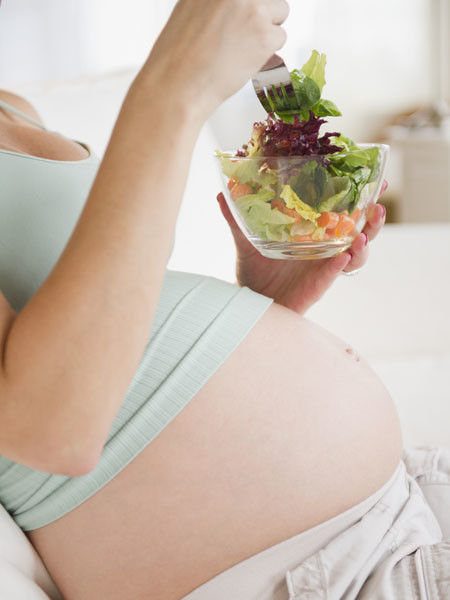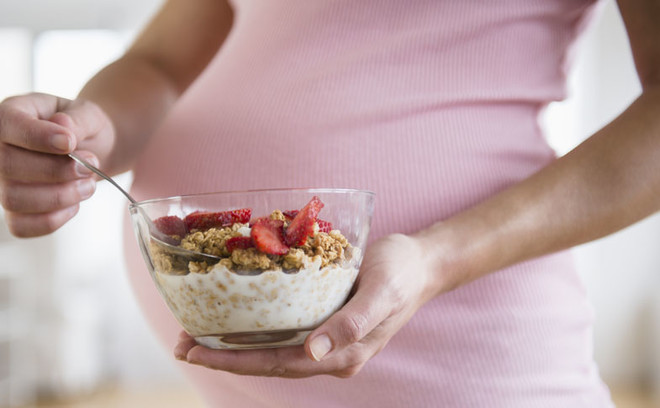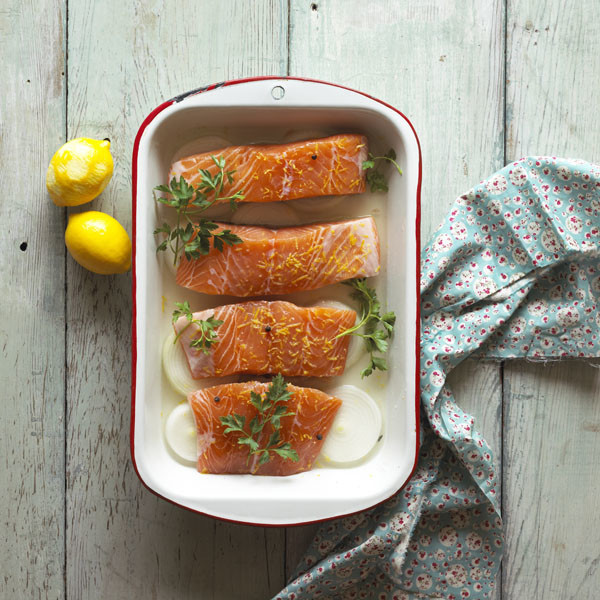Nutrition during pregnancy
Pregnancy is, perhaps, the most uniqueperiod in the life of any woman. You can finally relax the abdominal muscles and look stunning at the same time! True, the "interesting position" is not only beautiful, but also very responsible. From the first weeks, the habits of the mother begin to affect the offspring, and the health and development of the future baby directly depends on her diet. Therefore, it is very important to know what is, and what is better to give up during pregnancy. But first things first.  Photo: Getty
Photo: Getty
"There are for two", or Why not be afraid to gain weight?
When you want to eat everything at once, and evenmore, do not limit yourself. The expectant mother needs to eat more than usual. Weight gain is an extremely important part of pregnancy. Studies have shown that low maternal weight gain often results in low maternal weight gain, and this can lead to developmental delays. Curiously, the mother's weight is a priority: if she does not gain enough, the fetus may remain small, as if protecting the maternal organism. Here are some guidelines for weight gain: Normal weight women should gain 11-16 kg during pregnancy. Overweight women should gain between 7-11 kg. Women who are 155 cm or less should gain between 6 and 11 pounds. kg To gain the necessary weight, you need to add an additional 300-500 kcal to your usual diet. As a result, the total consumption can reach 2500-3000 kcal per day. Of course, the diet itself will play a decisive role. Photo: Getty
Photo: Getty
Eating or not eating? That is the question
Vitamins and microelements. List of the most necessary: Calcium. A good source will be dark green leafy vegetables, Chinese cabbage, tofu, legumes, figs, seeds, nuts, milk and porridges. Calcium intake may be important for the prevention of a condition known as preeclampsia (characterized by high blood pressure, swelling, etc.) Vitamin D is found in small amounts in many foods, but the best and most accessible source is the sun: outdoor walks 20 -30 minutes a day make up for the lack of this vitamin. But its deficiency can lead to poor absorption of calcium and a low level of infant weight. Vitamin B12 makes a significant contribution to the development of the fetus. Its a lot in animal nutrition: meat, poultry. Iron is critical for many processes, especially during pregnancy. It is enough in legumes, dark green vegetables, dried fruits, molasses, nuts, whole grains and in animal food. If at the same time the food is rich and vitamin C, then iron is absorbed better. Folic acid is necessary for the prevention of malformations of the neural tube of the fetus. Her intake is most needed during the first few weeks of pregnancy. And again, dark green leafy vegetables and legumes come to our aid. Zinc. His role in the process of growth and development is crucial for the fetus. A good source of zinc will be legumes, nuts, cereals and animal products. It costs two, or even three times, more than before pregnancy. The amount of protein affects the structural development of the fetus and the placenta. Omega-3 fatty acids. They can be obtained from flax seeds, walnuts, rapeseed oil and seaweed. A lot of omega-3 in fish oil, rich in fatty acids, which is useful for both the mother and the baby. These acids increase the development of the fetal brain, and also reduce the incidence and postpartum depression in the mother. Photo: Getty
Photo: Getty
Prohibited
Никотин и алкоголь – это даже не обсуждается.Кофе.A serving of more than 300 mg can harm the health of the fetus. Sugar, sugary drinks are empty calories. They are best kept to a minimum, as they have a significant impact on fetal development. Only one application of it can change the permeability of cell membranes in both the mother and the fetus. It is worth scrutinizing foods for trans fats very carefully! Here is a list of the most common: popcorn and chips; ketchup, mayonnaise and all kinds of sauces; semi-finished meat and fish products, frozen meals; ice cream; French fries, nuggets, and other fast food items; biscuits, donuts, waffles, pastries, cakes, chocolate bars, etc. Dry mixes for making soups, sauces, creams, pancakes, pastries, drinks, etc. And finally. Do not forget that it is important not only to eat right, but also to do it regularly, not to forget about meals, and not to overeat. It is important for the expectant mother to follow the regimen: eat 5-6 times a day in small portions and forget about diets at least during pregnancy.









